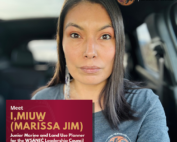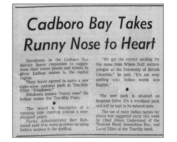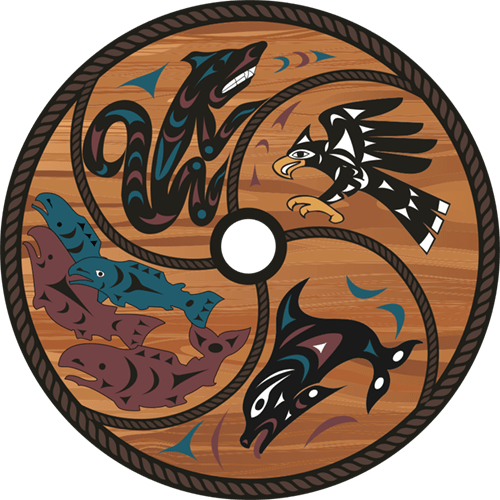Catching up with the Reef Net Project Youth
Learn more about the Youth Reef Net Workers and their recent experience setting the reef net this year. Click play to view the short video, or read the transcript below.
Interviewer: Can you tell us the date, time, and logistical information about launching the reef net?
Edna Elsworth:
I believe we set the reef net on August 7th. It was late afternoon and we had two canoes and three or four support boats we were successful in launching the net and the lead, which was really exciting and it was the farthest out that we have ever got in the program. So yeah, we’re really proud of that.
Interviewer: What was that experience like?
Desiree Jones:
I thought it was a really beautiful experience. I wasn’t able to go out on the canoes for the first little bit cause I had a knee injury that I had when we were on Pender, so that was pretty unfortunate. But this year we were actually able to set the net properly than we have the previous years cause we were able to get heavier leadlines and buoys added onto the net so it could sink down into the water more and we could actually see some fish like out in the bay. And that was really cool to experience and it kind of just showed us how far we’ve come with this project. So it was really amazing.
Julia Settler:
It felt like it was something I’ve done before and then I feel like cuz we had experienced people in Reef Net, it’s just, it felt like home. I just felt super comfortable being there and I felt like I’d done it before.
Landon Underwood:
I wanna use the word successful. I know I’ve used it a lot, but I think that’s what it was. Each year is another step forward in what we’re bringing back. Like it’s always gonna be successful in my opinion because the first year (of the project) hasn’t been done not how many years? The second year it was better than the first year and then this year was better than last year. So I always think it’s pretty successful.
Laila Morris:
I guess I could also agree that it was successful and it really felt like, because I’ve also been here the past three years too with the program, it felt like our hard work was really paying off. Yeah, like Julia said, it just felt like home and it felt like where we belonged.
Kristen Morris:
It was really an amazing experience. It felt like a warmness in your heart and it was like wow, we’re all really doing this and it was amazing how far we got.
Interviewer: What stood out to you the most about this experience?
Laila Morris:
I feel like with every launch that we do like this, we’re always growing together. It feels so easy and so natural for us to be that close and working that well together. That’s always something that I really look forward to within this program…is just that sense of family.
Edna Elsworth:
I think my favorite moment when we were launching the net was when we all decided that it was time for us to pull up the net everyone was really excited and there was a lot of energy there and I think that was probably my favorite only because we’d never gotten that far before and it was just really exciting.
Desiree Jones:
The teamwork that we did together, especially out on the water and you know, even like when mistakes are made, we all kind of do our best to take that opportunity as like a chance to grow together and learn something from It.
Interviewer: How was it having so many community members out there supporting you?
Edna Elsworth:
I think it was really great to have a lot of community members out there with us. I felt that it was very important for as many people in the community to witness that moment in time when we were bringing back our old ways of fishing and our old technology and I think it was really beautiful to share with them.
Julia Settler:
I thought it was really awesome to have people on the sideline cheering us on. I was kind of nervous to go out when we first started that day and it was just reassuring to have like, I guess cheerleaders on the side. It was just awesome to see.
Desiree Jones:
It was really nice to feel all the support from even surrounding communities and we even had people come from Lummi who practice reef net fishing over there as well and they came to witness that. But yeah it was just really beautiful to feel all that support from you know, all the other community members and they were all just as excited as we were.
Interviewer: What did you learn in the launching that you didn’t learn practicing on land?
Kristen Morris:
Doing it on the field when we were practicing. I thought it was gonna be like pretty similar to that and it was, but it was like different to get help from the boats that were around to help out as well as on the canoes.
Trevor Horne:
Probably like tying it from the boat, like getting it off the boat into the water was pretty confusing for me.
Interviewer: What was it like being out on the boats for the first time this year?
Trevor Horne:
It was pretty windy out. It wasn’t calm at all. Like the current was pushing us in all the time, we were almost bumping into each other.
Laila Morris:
I feel like it’s always going to be nerve-wracking in a way because we’re bringing back this old way of fishing for our people. So it’s always gonna be like a little voice at the back of our minds. Like ‘Are we doing this right? Is this the way that we should be doing it?’ And kind of really just following our intuition and following what the other knowledge holders and elders have to say. I also think with every year that this program runs, it’s smoother and easier.
Edna Elsworth:
I think it was equal parts exciting as well as daunting just because you know, you never know how it’s gonna go in the beginning so we kind of just take it step by step, and then there’s a lot of coordinating with each other as well as the support boats and just communicating with each other. So I think there’s a lot of pressure that is put on all of us. So I think that’s where a lot of our stress comes from. I think as a team we’ve gotten better at problem-solving and communicating with each other and I think having this be our third year in the program, we know a bit more of what to expect as far as setting it from the support boat and being on the canoes and just working with each other to be successful.
Interviewer: Could you tell us something you learned that you didn’t expect to learn?
Julia Settler:
I didn’t expect that tide to change so quickly while we were on the water. I just, I’m so shocked and amazed that like our ancestors knew the tides and like how the waters worked and it was just amazing to think how well they landed back then. And then we have all this technology now and we had our frustrations with that.
Interviewer: What was it like returning to shore afterward?
Landon Underwood:
I think everyone who was there was probably happy. You asked like about how people were there watching us and I feel like everyone was in a good mood. Everybody got to see us set the net. Everyone got to see fish for the first time jumping around right in front of us. And then we also had our relatives over from across the water from Lummi over there with us too. So like, just like an awesome feeling being able to come back under shore and knowing we’re like, are this much closer to being able to get fish in our net and when that happens it’s just gonna be, it’s gonna be an unreal feeling. So being able to get that close this year, it’s just, it’s a, it’s a very happy feeling.
Edna Elsworth:
I think all of us definitely had a sense of pride with as much we had accomplished that day, but I think that was also contrasted with a bit of anxiousness just because we all wanted to stay out there just a little bit. Even if we were tired and hungry and dehydrated. It was definitely something that we wanted to go further with. But that’s something for the future.
Interviewer: How long were you out on the water?
Laila Morris:
I wanna say maybe three, four hours. I don’t know. We also weren’t really like looking at the clocks very much either.
Interviewer: If there was one thing you could change about the process what would it be?
Landon Underwood:
The one thing I think I would change is if we were us as our W̱SÁNEĆ people here, like we had our relatives from Lummi across the water come over, they’ve also done it, they’ve made their own net, they’ve also done it successfully I believe. If we were able to come together W̱SÁNEĆ in one canoe, Lummi in one canoe we’d be able to do it together. I think it’d just be a neat idea to be able to pull in together and also show that within our communities around here, we don’t believe in that border; they were able to come over it. Just showing how close we all could be if we weren’t determined by a borderline.
Edna Elsworth:
I think one thing that I would not necessarily change, but more so add to the program is advertising to the community when we were going out and what it would mean to be out there to us. And for them just to be able to share that moment with us, I think it’d be really great to share that with the community, as much of the community as we could.
Laila Morris:
I also think, not so much more advertising but like maybe strive for setting the net more than once a summer because although it is a lot of work, all of us setting a few days that we just go and maybe test it out for a couple of hours out on the water, invite the community to come and watch us and just really unravel those kinks that we have.
Interviewer: How do you feel about the number of people working on this project?
Landon Underwood:
It’s never kind of just us. There are always a lot of people behind the scenes with what kind of goes into this. Like yes, we’re the ones setting it, but we always have our people in the support books who are coming out and then our bosses who are working at the office behind the scenes and doing everything for us. So it’s never just us.
Interviewer: What is your message to youth in the community that may be thinking of joining the reef net program?
Kristen Morris:
Just to put your heart out into it when you’re out there on the water, have patience, and have fun.
Trevor Horne:
Try it, try it out at least for a couple weeks.
Laila Morris:
I would tell them to try it out because why not? You are doing really good work for our communities doing this job and for the future generations to come as well. Um, and I think it really is a privilege to be a part of this group because of how long we have been without our reef net technology. But yeah, try it out. Connect with people that you may know from your community but don’t really know on that level and just create some new memories and new friends.
Landon Underwood:
Don’t be scared to come and try it out, even if you don’t think you’re gonna know anybody or if you’re nervous about being on the water or just testing out fishing for your first time. Don’t be, don’t be discouraged by anything. Just come on out- the more the merrier
Julia Settler:
That it was definitely like something to be scared of at first, but like there was so much team-building and teamwork that was going on throughout the program. So there’s nothing to be scared of. Don’t be scared to try new things.
Landon Underwood:
We’re all taking a step toward revitalizing something that was taken away from us hundreds of years ago. Like we’re, we’re moving in the right step with youth leading it along the way.






